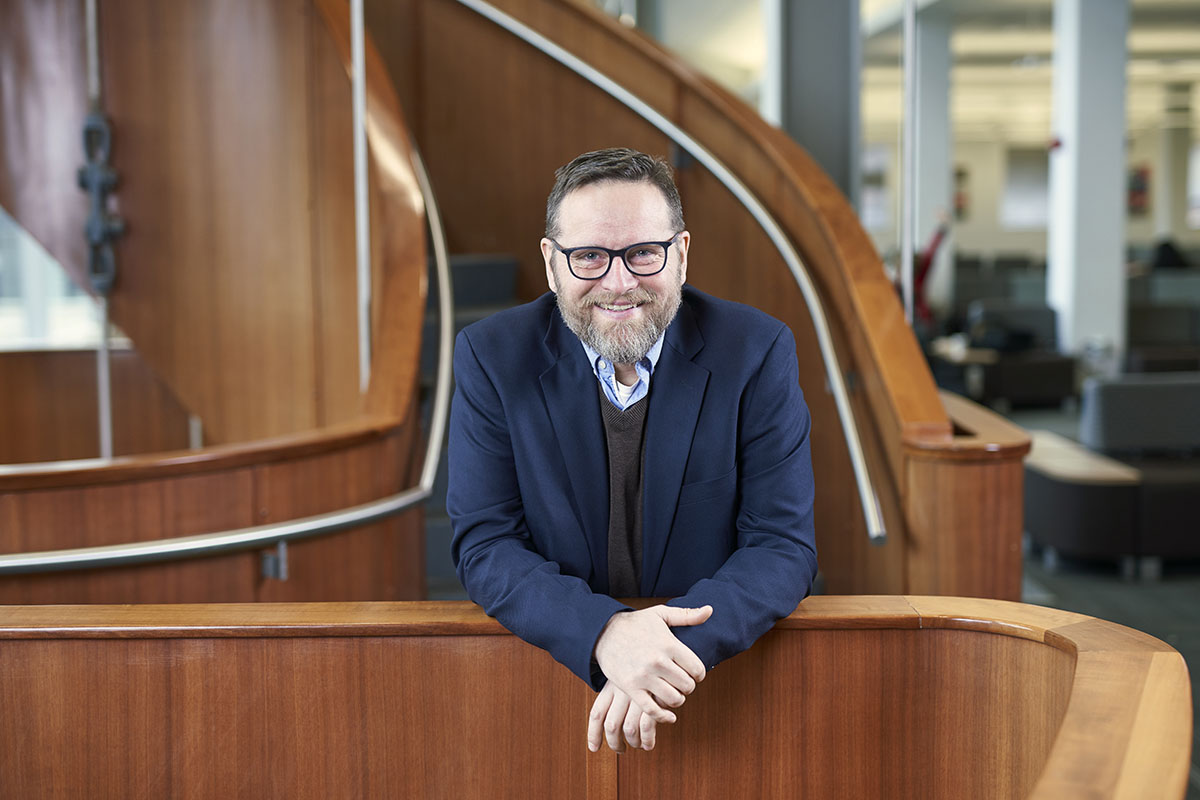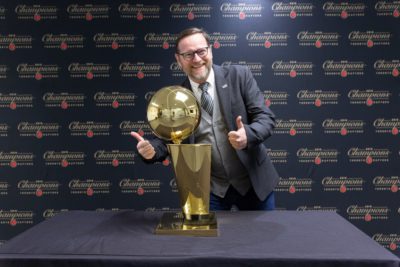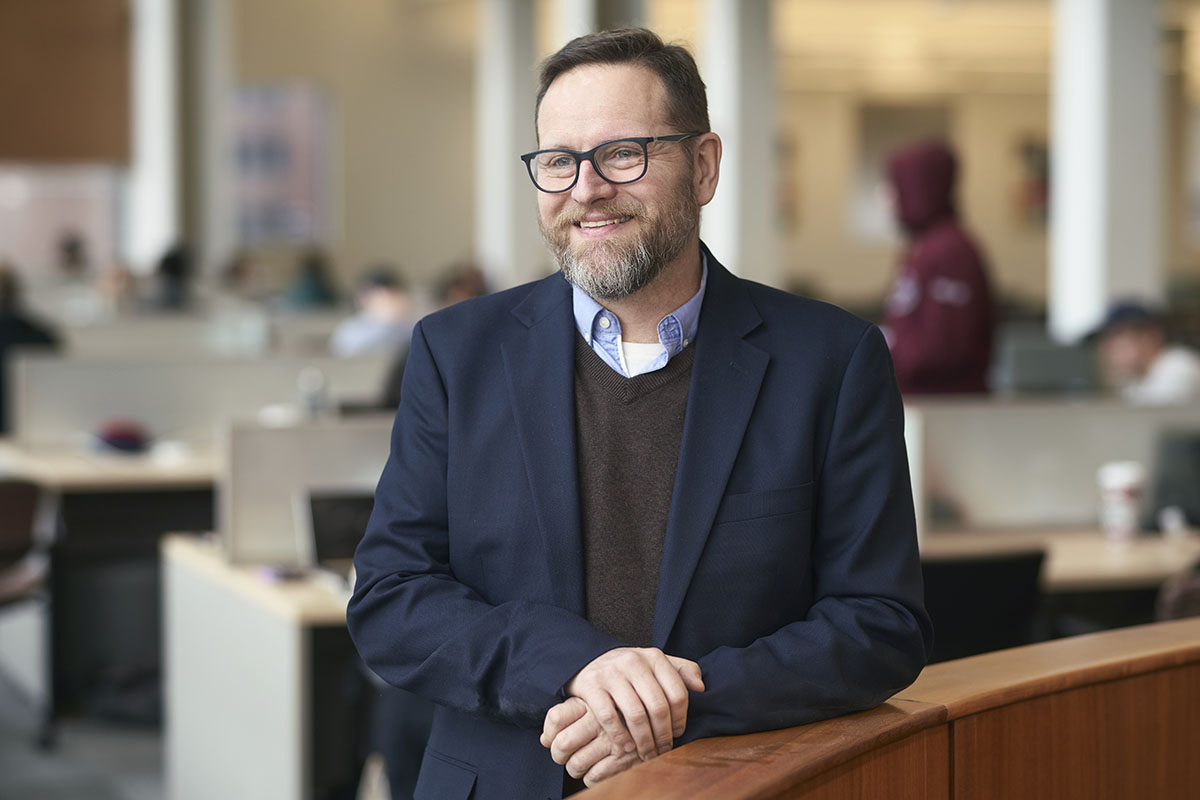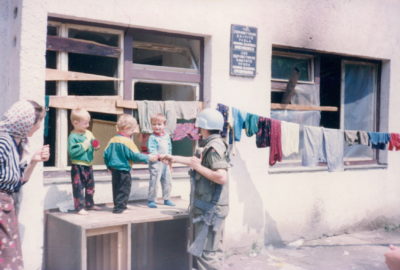The Warrior-Scholar: Showing that peace and inclusivity is possible with the power of cross-sectoral partnerships
It’s not often that you meet a university faculty member who is a retired airborne, assault-pioneer, infantry officer. In fact, Andrew Webb is a self-described “Warrior Scholar”—but we’ll get to that.
Joining the Sprott faculty in 2017, Andrew Webb’s research area has flourished in the International Business arena with contributions that are advancing our understanding of cross-sector social partnerships, namely in the field of sport for development. In addition, his forward-thinking focus on experiential learning is bringing an exciting new perspective to management education. With an intense passion for higher learning, teaching—and peace, one could argue that Webb is illuminating the value of sport in bringing about cooperation, not only in business, but in society as well.

The Scholar
Let’s rewind to 2008, when Webb, as general manager of Laval University’s award-winning Experiential Learning program, spearheaded one of their biggest and most successful projects to date—organizing, managing and leading the 2008 National Winter Special Olympics.
“It was, bar-non, the best teaching experience of my life.”
While this fully student-run program provided invaluable learning opportunities in management and leadership for students, it concurrently taught Webb that by combining experiential learning with the magic of sport, one can teach management while improving societal perception of inclusion and tolerance. Sport for development can lead to accepting people with differences. Moreover, Webb recognized how students thrived in an environment that fostered trust and responsibility: “Given the opportunity, students can achieve great things.”
Following this experience Webb dove into research on the idea of sports for development and inclusion. At that time, it was an emerging field of research; there were not a lot of publications on the subject—he was at the start of the wave of the importance of this research in business.
Today, his research program looks at cross-sector partnerships; specifically, the relationship between corporations and nonprofit organizations. Webb is particularly interested in why these partnerships establish and how they’re nurtured and maintained in order to tackle many of the world’s grand challenges—even when the fundamental objectives of the partners involved are completely different.
“What’s interesting is that many of the grand challenges that humanity face are just so big that there isn’t a single entity that can tackle them. Think eliminating poverty, doping in sport, or social inclusion of people with an intellectual disability. But cross-sectional social partnerships are a way to do this. However, there isn’t a lot of information or research about how they work.”

Webb’s research mobilizes actor-network theory and semiotics to examine these unique types of alliances. He’s particularly interested in the Special Olympics, as well as the nonprofit foundations of professional sports teams such as FC Barcelona’s Barça Foundation, and the MLSE Launch Pad (Maple Leaf Sports and Entertainment Inc.), and their associated corporate sponsors.
He’s working to tease out what success criteria are important to build sustainable relationships between corporations, governments, and non-profits. Moreover, he’s taking a holistic approach to his research, including perspectives from the corporate sponsors, the nonprofits, as well as the athletes to triangulate the efficacies and obstacles of these alliances.
Webb sees the important role sport, and other actors, can play to help mitigate world issues, but he also sees that for this to work, corporate sponsors, government, athletes, and the foundations working for a cause, need to come together in a way that ensures development, inclusion, business, and most importantly, uniting people.
Complimentary to Webb’s research, he’s implementing a project-based, service-learning initiative in the Sprott School of Business. With this new program, Webb is bringing his years of experience in experimental learning to create an environment that will be unparallel to anything offered in Canadian universities thus far. Students will participate in this forward-thinking learning approach that will not only better prepare them for the workforce but will teach them skills and perspectives that will propel them into the future of business—a future that values the importance of communication, flexibility, cooperation, and adaptability. Webb recognizes that it is vital to foster individualized learning opportunities, not just creating clones.
“We need to prepare students for future challenges; to be able to adapt and improvise, because we don’t know what the future will hold.”

The Warrior

Webb has always had this visionary approach to life. At 23-years-old, a much younger Lieutenant Webb was a platoon commander and peacekeeper for the United Nations (UN) with 32 soldiers under his charge. It was while stationed in Srebrenica, Bosnia that he had to negotiate a passage through a Serbian controlled sector.
His first attempt was unsuccessful: “Trust and language barriers are quite limiting…and inadvertently parking my armoured personnel carrier in their mine field, of course, didn’t help.”
Upon returning the next day, Webb found that the Serbian officers were gone and only their soldiers were holding the position. Thinking quick on his feet, he seized an opportunity to initiate a friendly soccer match between the Serbians and Canadian soldiers—an olive branch if you will. “We lost horribly, but we gained their trust, and with their help, our soldiers were able to gain access through the area.”
Webb used this tactic again, but this time right in the centre of Srebrenica, a village that had become a refugee camp for over 40,000 refugees. As a way of providing some respite to his troops and to concurrently connect with the local population, Webb organized an afternoon off so his troops could play Canadian football; a sport that the locals had never seen before. Thousands of locals came to watch, enthralled and entertained, and ever curious about this “unusual” game.

Through these experiences, Webb witnessed how sport provided a precious opportunity for breaking the ice—a chance for locals to talk to each other and his soldiers, and how it, if only for a short time, united humanity. It was then Webb realized that there was something about sports that connected two sides when language was an obstacle. Sport broke down barriers. It helped gain trust—one “football” at a time.
Working to advance the concept of higher learning, foster partnerships between those who can fund and those that can do, and perhaps ambitiously help bring about cooperation and peace—Andrew Webb is indeed a visionary and a passionate “Warrior-Scholar.”